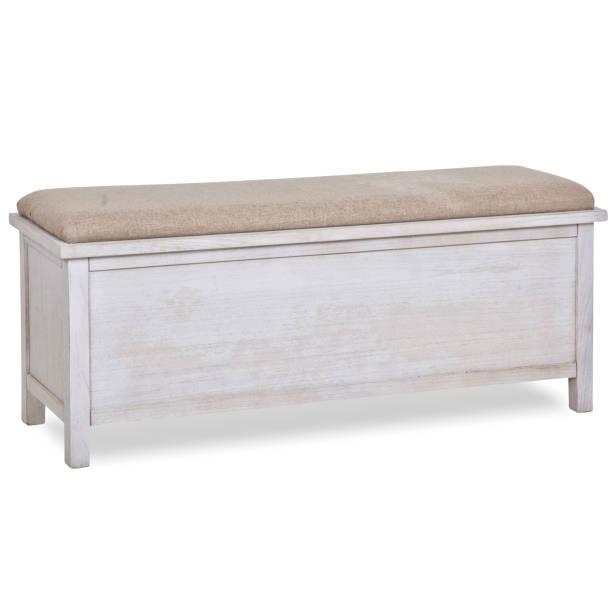Wood vs. Plastic vs. Metal Storage Benches: Which is Best?

Storage benches are one of the most useful pieces of furniture you can add to your home or outdoor space. Not only do they provide extra seating, but they also offer valuable storage for everything from shoes and toys to garden tools and patio cushions. But with so many styles and materials to choose from, one big question remains: Which storage bench is best—wood, plastic, or metal?
Each material has its own strengths and drawbacks. Your choice will depend on where you want to place the bench, how you plan to use it, your budget, and your style preferences. In this article, we’ll compare wood, plastic, and metal storage benches to help you decide which one is right for you.
1. Wooden Storage Benches
Pros:
-
Classic and Timeless Look: Wood storage bench offers a natural, warm appearance that suits many home decor styles, from rustic farmhouse to modern minimalist.
-
Sturdy and Durable: High-quality hardwoods like teak, cedar, or oak are strong and long-lasting, even for outdoor use.
-
Customizable: Wood can be painted, stained, or refinished to match your existing furniture.
-
Eco-Friendly Options: Many wooden benches are made from sustainable or reclaimed wood.
Cons:
-
Requires Maintenance: Wood can warp, crack, or rot if not properly sealed, especially when used outdoors. It may need regular staining or sealing.
-
More Expensive: Wooden benches often cost more than plastic, especially if made from hardwood.
-
Heavier to Move: Solid wood benches can be quite heavy, making them harder to move around.
Best Use:
-
Indoor entryways, bedrooms, or living rooms for style and charm.
-
Outdoor spaces only if the wood is treated and weather-resistant (like teak or cedar).
2. Plastic Storage Benches
Pros:
-
Weather-Resistant: Plastic benches are often waterproof and resist rust, mold, and mildew. They're great for outdoor use.
-
Low Maintenance: No painting or sealing needed. A simple wipe-down with a damp cloth keeps it clean.
-
Lightweight and Portable: Easy to move, even when full of stored items.
-
Budget-Friendly: Usually the most affordable option.
Cons:
-
Less Stylish: Plastic benches often lack the aesthetic appeal of wood or metal. They may look cheaper or more utilitarian.
-
Lower Weight Capacity: Plastic benches may not be as sturdy, especially for heavy items or frequent use.
-
Can Fade or Crack: Over time, sun exposure can cause fading or brittleness, particularly with low-quality plastics.
Best Use:
-
Patios, decks, balconies, or poolside where exposure to the elements is a concern.
-
Budget-conscious households or temporary solutions.
3. Metal Storage Benches
Pros:
-
Strong and Durable: Metal benches, especially those made from aluminum or steel, are very sturdy and can support heavy loads.
-
Modern Appearance: Sleek, industrial designs work well in contemporary settings.
-
Weather-Resistant (if coated): Powder-coated or stainless steel models can withstand rain and humidity.
-
Security-Friendly: Some metal benches come with lockable storage, making them good for outdoor tools or valuables.
Cons:
-
Can Rust (if untreated): Cheaper or uncoated metals may rust over time, especially in humid or rainy climates.
-
Can Get Very Hot or Cold: Metal reacts to temperature changes, which may make the bench uncomfortable to sit on without a cushion.
-
Heavier Than Plastic: While not as heavy as some wood, metal benches can still be bulky.
Best Use:
-
Modern indoor spaces or outdoor areas where strength and durability are key.
-
Garages, porches, or workspaces where utility is more important than style.
Key Factors to Consider When Choosing a Storage Bench
1. Location
-
Indoor use: Wood or metal are best for stylish living spaces.
-
Outdoor use: Plastic or treated wood/metal that resists moisture and sun damage.
-
Small balconies or patios: Lightweight plastic benches are easier to manage.
2. Purpose
-
Seating and decoration: Wood benches shine with charm and beauty.
-
Heavy-duty storage: Metal is the strongest choice.
-
Light storage and casual use: Plastic gets the job done with minimal fuss.
3. Budget
-
Low budget: Plastic benches are affordable and easy to maintain.
-
Medium budget: You can find quality metal or softwood benches.
-
Higher budget: Premium hardwood benches offer durability and timeless design.
4. Style
-
Traditional or rustic decor: Wood fits in perfectly.
-
Modern or minimalist: Metal looks clean and sleek.
-
Casual or family spaces: Plastic is practical and colorful.
Final Verdict: Which Is Best?
There is no single “best” storage bench—only the best one for your needs. Here's a simple summary:
-
Choose wood if you want something beautiful and strong for indoor use or a covered outdoor space. It adds character and warmth to your home.
-
Choose plastic if you need something affordable, easy to clean, and weather-resistant for outdoor use or kids' areas.
-
Choose metal if you need strength, security, and a sleek modern look, especially in workspaces or contemporary environments.
Each material brings its own advantages, so the right bench for you will depend on where you’ll use it, how much you want to spend, and what style you love.
- Information Technology
- Office Equipment and Supplies
- Cars and Trucks
- Persons
- Books and Authors
- Tutorials
- Art
- Causes
- Crafts
- Dance
- Drinks
- Film
- Fitness
- Food
- Oyunlar
- Gardening
- Health
- Home
- Literature
- Music
- Networking
- Other
- Party
- Religion
- Shopping
- Sports
- Theater
- Wellness



